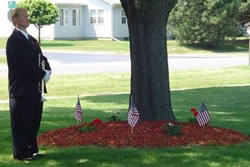 I played Taps for a veteran's family that had the second and third generations present at the cemetery. The deceased was a WWII Marine Corps vet, and his sons were big tough, blue collar, biker types in their 40's. The grand kids' ages ranged from as young as maybe 3 or 4 years old to high school age. The teenagers clearly didn't want to be there; they had their iPods and game devices and barely looked up the whole time. You could almost say they were disrespectful, given the solemnity of the event. I played Taps for a veteran's family that had the second and third generations present at the cemetery. The deceased was a WWII Marine Corps vet, and his sons were big tough, blue collar, biker types in their 40's. The grand kids' ages ranged from as young as maybe 3 or 4 years old to high school age. The teenagers clearly didn't want to be there; they had their iPods and game devices and barely looked up the whole time. You could almost say they were disrespectful, given the solemnity of the event.
We got to the Military Honors part of the service, where active duty Marines stand at each end of the casket to salute the fallen while I sounded Taps... when I was done, I looked up at these big, tough bikers and they were pretty choked up, and the teenagers were wide-eyed and had that "Whoa, this is serious" look on their faces.
A Military Honors Funeral concludes with the folding of the flag, and presenting it to the next of kin, in this case the oldest son. The Honor Guardsmen then stepped back and saluted that flag one final time while it was in the hands of the son. The tears were flowing, and there was audible sobbing and sniffling. Big, strong men were reduced to tears.
As the family was leaving the cemetery, there was a young mother and her little daughter holding hands and walking toward the exit. I overheard as the little girl looked up at her mother and asked, "Mommy, was Papa a hero?" The mother just knelt down and hugged her daughter and broke down in full blown tears and said "Yes he was, and he'll always love you, even from heaven."
-Tom Allen, founder of Operation Taps
The National Citation is an award that is given to individuals or organizations that, through their efforts, reflect the goals and Object of Phi Mu Alpha. It is intended to highlight groups that have sacrificed or given of themselves in ways that profoundly affect music and musicians in the country. At this year's National Convention, the Fraternity is pleased to present the National Citation to Operation Taps.
The objective of Operation Taps is "to promote Taps bugler volunteerism among the civilian brass playing community, and to encourage music organizations to proactively connect with their communities to pay tribute to America's Military Heroes." In 2000, the US Department of Defense ruled that every United States military service member of any era who served honorably has the right to receive a full military honors funeral. Each year, hundreds of thousands of veterans pass away. And not all of them are able to have a bugle player at their funeral. Operation Taps aims to help solve that problem. Tom Allen, founder of Operation Taps – and a former drum and bugle corps member himself – is working hard to see that each veteran receives the respect he feels they are owed.
By the Numbers
23.8 million - number of living US veterans who will be eligible for a full Military Honors Funeral service
686,000 - estimated number of veterans who will die this year
"When my father passed away at age 76 in 2002," says Allen, "not only did he have three world champion buglers in his family to play Taps, he had literally hundreds of horn players ready, willing and able to do it." The revelation that so many veterans are not afforded this honor came as a shock, and it inspired Allen to work toward correcting the issue. "The process is so varied from state to state, and even community by community within states," says Allen. "There are probably some areas of the country where every vet gets a live bugler, and those musicians and families might not perceive a shortage of buglers at all. But it is absolutely true that are some communities where they just think that there are no buglers at all; some of these are communities where I know for fact there are hundreds of horn players within an hour's drive."
The effort is potentially staggering, with hundreds of thousands of veterans passing away each year. "It will be tough to make a dent statistically," admits Allen. "The average age of WWII vets is nearing 90, and even the Vietnam-era vets are in their mid-60's. In the state of New York, the National Honor Guard just reported that 2011 was their most active year ever, delivering honors for over 10,000 funeral services. According to some of their personnel, strictly off the record and anecdotally, the number of times they have a live bugler is less than 20 percent." Such sobering statistics do not invalidate the effort, however. If we focus only on the remaining task, we can lose sight on the good that is possible through any improvement in numbers. If not for Allen's efforts, for example, the story at the beginning of this article would never have happened.
 The Operation Taps website boasts many similar stories of men and women throughout the country who have either performed Taps or been touched by a performance of Taps. And the primary obstacle in providing this honor to deserving veterans is not finding more players, but simply creating awareness of the problem in existing bugle players. "I think that the use of the electronic device – called the "Ceremonial Bugle" – will still be used as a last resort," says Allen, "but more and more civilian musicians are becoming aware of the issue and are learning how to make themselves available." The Operation Taps website boasts many similar stories of men and women throughout the country who have either performed Taps or been touched by a performance of Taps. And the primary obstacle in providing this honor to deserving veterans is not finding more players, but simply creating awareness of the problem in existing bugle players. "I think that the use of the electronic device – called the "Ceremonial Bugle" – will still be used as a last resort," says Allen, "but more and more civilian musicians are becoming aware of the issue and are learning how to make themselves available."
Creating awareness and connecting with veteran organizations consumes most of Allen's work, and the same can be done by others in the music field. "The biggest thing we can do as music educators and musicians is to educate ourselves on the tradition of Taps," he says, "and make sure that the next generation knows what it is all about." Allen also refers many to Bugles Across America, a national organization that serves as a database of volunteer buglers. Interested musicians, Allen says, are encouraged to sign up for the website's database. There is no obligation to accept requests to play Taps, but it provides people and organizations with one more performer to contact for their ceremonies.
There are other potential benefits to this type of playing for musicians. "To a young brass player, playing Taps probably isn't considered cool," says Allen. "In fact it's kind of a sad gig. But I'll tell you, my abilities as a soloist certainly improved once I started doing this. If you can stand in a frozen cemetery, with no other musical accompaniment, and flawlessly sound Taps with a whole family looking on as you pay tribute to the most important member of that family, then you can certainly stand in front of music school selection committee and nail your audition." It's a test of nerve and will that can improve a musicians performing ability mentally, physically, and spiritually.
As Sinfonians, honoring our past, including all of the brothers who helped paved the way for what our organization is today, is infused into everything we do and is something we should never forget. The patriotic and brotherly ideals displayed by Operation Taps, and the work Allen has done in its promotion, reflect our own goals and endeavors.
"The bottom line for me," says Allen, "is that my father had hundreds of guys who could play Taps for him, but somewhere in the country – right now – someone else's father is being put to rest to the sound of a taped version of Taps. To think that this tradition, which dates back to the Civil War, may disappear on our watch would be an insult to all the fathers who proudly served this nation, and just as importantly, and just as proudly, supported us as we developed our talents." |











